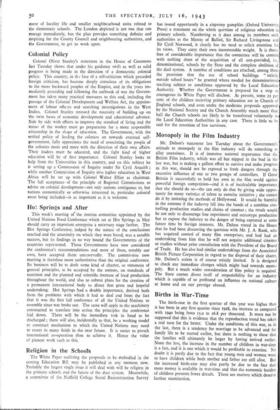Colonial Policy
Colonel Oliver Stanley's statement in the House of Commons list Tuesday shows that under his guidance swift as well as solid progress is being made in the direction of a democratic colonial policy. This country, in the face of a self-criticism which preceded foreign criticism, has become deeply conscious of its obligations to the more backward peoples of the Empire, and in the years im- mediately preceding and following the outbreak of war the Govern- ment has taken many practical measures to this end, including the passage of the Colonial Development and Welfare Act, the appoint- ment of labour officers and searching investigations in the West Indies. Colonel Stanley stressed the necessity of building up on the twin bases of economic development and educational advance. Side by side with efforts to improve the standard of living and the status of the worker must go preparation for a more responsible citizenship in the shape of education. The Government, with the settled policy of leading the colonies on towards eventual self- government, fully appreciates the need of associating the people of the colonies more and more with the direction of their own affairs. Their leaders must be educated, and the right kind of higher education will be of first importance. Colonel Stanley looks to help from the Universities in this country, and on this subject he is setting up a Commission of Inquiry under Sir Cyril Asquith ; while another Commission of Inquiry into higher education in West Africa will be set up with Colonel Walter Elliot as chairman. The full acceptance .of the principle of Regional Commissions to advise on colonial development—not only nations contiguous to, but nations economically or otherwise interested in, particular colonial areas being included—is as important as it is welcome.


























 Previous page
Previous page